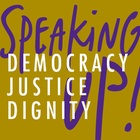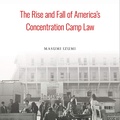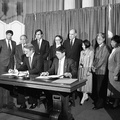Read Part 1 >>
The Redress Campaign
In 1980, the community’s long-time political voice, the National Association of Japanese Canadians (NAJC) decided to investigate redress possibilities. By 1984, the campaign began in earnest. The issue became national front page news, when then leader of the opposition, the Progressive Conservative leader Brian Mulroney challenged the Liberal Party leader, Prime Minister Pierre Trudeau, to do the right thing by Japanese Canadians.
Initially within the Japanese Canadian community there were factions who needed to be won over [a topic that I go into in my book]1 outside our community, however, there were even greater hurdles to overcome. The NACJ’s strategists determined that Canadian politicians would only sit up and take notice if Japanese Canadian redress was a matter of concern for all Canadians. Ultimately victory required the winning over of the media to help build public support. Armed with indisputable documentation and hard facts we convinced the journalists, television reporters and editorial boards across the country of the merits of our issue and they helped us take our case to the Canadian people.
Early on, we also realized that without the support of a broad coalition of Canadians our cause was dead in the water. From the beginning, we found a diverse collection of allies. Not surprisingly, our strongest support came from other ethnic and visible minority organizations, as well as from the churches, the trade union movement, and civil libertarians.
The only organized and vocal opponents to redress were World War II veterans, some of whom still viewed Japanese Canadians as enemy aliens. Government apologists had long touted the possibility of Japanese Canadian fifth-column activity as a justification for the internment of an entire community and the seizure and sale of their property. Instead, overwhelming evidence subsequently brought to light by academics, the media, and the NAJC has proven that the MacKenzie King government and complicit B.C. politicians and officials were clearly motivated by racism and mean-spirited greed for economic gain.2
Slowly over the 1980s, the tide of public opinion was turning in favour of Japanese Canadian redress. In 1984, we published Justice Denied, which documented our story and set out our demands for individual compensation and civil rights guarantees. The following year, we released an actuarial study prepared by the reputable firm of Price Waterhouse that documented from government archives our property and income losses at almost half a billion dollars. No attempt was made to estimate the cost of the civil and human rights violations. Trying to lobby politicians, opinion makers, and main street Canadians we launched a national letter writing campaign [1984-88] and formed a National Coalition for Japanese Canadian Redress that included a who’s who of the country’s best-known personalities, organizations, and unions [1986-88]. The Canadian Council of Churches sponsored an ad in Canada’s national paper, the Globe and Mail featuring many of the country’s moral authorities [1986] who urged the government to the negotiation table. The campaign culminated in a major demonstration on Parliament Hill in Ottawa [1988].
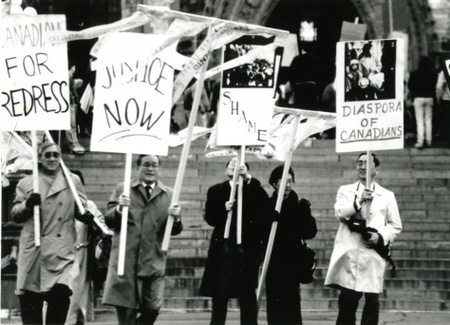
Redress Rally March in Ottawa 1988 (Japanese Canadian Cultural Centre Archives. Photo Courtesy of JCCC)
Over the years, public opinion polls offered a tangible sign of growing support. In 1986, a NAJC poll indicated 63% supported redress. Two years later, in 1988, a Government survey indicated 71% supported redress. By 1989, 76% approved the acknowledgement and the opposition had diminished from 25% in 1986 to 12% by 1989. Over the years, the NAJC had done its homework and laid the factual and political groundwork for its claim.
The winning of redress on September 22, 1988 restored honour to my community. On that day in Parliament then Prime Minister Mulroney publicly acknowledged that the Canadian government had “wrongfully incarcerated, seized the property and disenfranchised thousands of citizens of Japanese ancestry.” The settlement package contained the following provisions: an acknowledgement of injustice done to Japanese Canadians during and after World War II; a payment of $21,000 to each survivor [a total of almost half a billion dollars]; $12 million to the community to be administered by the NAJC; and $24 million for a jointly funded Canadian Race Relations Foundation to foster racial harmony and help fight racism.
With the earlier repeal of the War Measures Act [1988] and with the terms of our settlement, Japanese Canadians hope that even in this post September 11th world, other groups in Canada will never have to relive our history.3
When authority in any form bullies a man unfairly
All other men are guilty; for it is their tacit
assent that allow the authority to commit the abuse.
If they withdrew their consent, authority would collapse.—Pierre Trudeau, a Canadian Prime Minister
For Japanese Canadians redress was our sweetest moment and for all Canadians it marks one of the most significant civil rights victories in the country’s history. I feel extremely fortunate to have been a participant in that struggle, as a NAJC legal counsel, strategist in the campaign, and as one of the negotiators with the government.
Our dark cloud of a half century dissipated
The fairest day
In Japanese-Canadian history
Dawns.
Our joy is unsurpassable.—Tanka by Takeo Ujo Nakano to commemorate the Japanese Canadian redress settlement, September 22, 1988. Translation by Leatrice Nakano Willson.
Our history demonstrates the enormous strides towards racial equality that have taken place this century in Canada. With roots in this country, going back to the 1870s, we are now per capita among the country’s most highly paid, educated, and assimilated—in short, an ethnic “success story”.
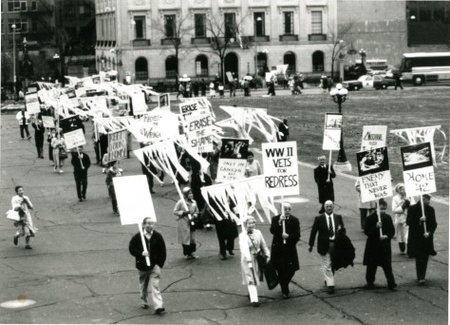
Redress Rally March in Ottawa 1988 (Japanese Canadian Cultural Centre Archives. Photo courtesy of JCCC)
Notes:
1. Maryka Omatsu, Bittersweet Passage: Redress and the Japanese Canadian Experience, (Toronto: Between the Lines Press), 1992
2. Sunahara, pp. 161-69.
3. The “War Measures Act” (WMA) was repealed in 1988 and replaced by the “Emergencies Act” which ensures greater civil rights protections. The “Emergencies Act” was repealed and replaced in 2002 with the “Anti-Terrorism Act” (post 9/11) and has powers similar and perhaps more draconian that the WMA, although there are some civil rights guarantees.
The paper “Lessons from the JC Experience” was given on May 21, 2002 at Dartmouth College, Hanover, New Hampshire. The Honourable Madam Justice Maryka Omatsu was the William Timbers lecturer, a guest of the Nelson Rockefeller Center & the Dartmouth Lawyers Association.
* * *
* Maryka Omatsu will be speaking at “Border Crossings: A Comparative Assessment of Japanese American and Japanese Canadian Redress” session at JANM’s National Conference, Speaking Up! Democracy, Justice, Dignity on July 4-7, 2013 in Seattle, Washington. For more information about the conference, including how to register, visit janm.org/conference2013.
© 2002 Maryka Omatsu



